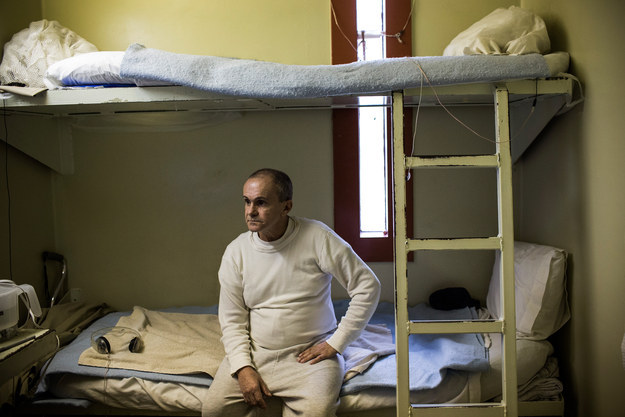A Rhode Island prisoner with hepatitis C, photographed in 2013. Andrew Burton / Getty Images / Via gettyimages.com
This week, two inmates with hepatitis C filed a class-action lawsuit against the Massachusetts Department of Correction for not giving them and other prisoners treatments for the highly infectious liver disease.
According to the suit, of the 1,500 state prisoners in Massachusetts infected with the hepatitis C virus, just 3 are receiving treatment.
Although hepatitis C treatments used to require a year or more of injections and come with nasty side effects, new oral drugs have a 90-95% rate of curing the disease in 12 to 24 weeks.
Trouble is, these newer drugs cost far more than already strapped prison health care budgets can bear. In 2014, just 16 Massachusetts inmates a month, on average, were being treated for hepatitis C, way down from 81 per month in 2009.
“These drugs work, they don’t have to be taken for very long, there are no side effects, and they’re effective nearly 100% of the time,” Joel Thompson, staff attorney at Prisoners’ Legal Services, and lead counsel on the Massachusetts lawsuit, told BuzzFeed News.
“But because of the sticker price of the drug and the large cohort, it’s a scary number of people in line,” Thompson added.
The new generation of hepatitis C drugs are among the most expensive drugs on the market. Sovaldi and Harvoni, both manufactured by pharmaceutical company Gilead, cost $84,000 and $94,500, respectively, for a 12-week treatment. The third option, a drug called Viekira Pak, made by a company called AbbVie, costs around $83,300.
The Massachusetts Department of Correction did not respond to a request for comment for BuzzFeed News. Its private health contractor also named in the suit, Massachusetts Partnership for Correctional Healthcare, declined a request for comment.

Frank Fuller, a California prisoner with hepatitis C, photographed in 2013. Andrew Burton / Getty Images / Via gettyimages.com
Prisoners have a legal right to medical treatment.
“The courts have said that prisons have to provide medical care and can’t be deliberately indifferent to serious medical needs,” Gabriel Eber, senior staff counsel at the ACLU’s National Prison Project, told BuzzFeed News. “And, especially in prisons, hepatitis C is a very serious medical need.”
The legal justification of the new Massachusetts lawsuit — as well as a similar suit filed last month by inmates in Minnesota — is the Eighth Amendment’s prohibition of cruel and unusual punishment. Prisons are not allowed to be “deliberately indifferent” to the prison population’s medical needs.
“It’s a funny quirk of our legal system that the only people with a Constitutional right to adequate healthcare are our prisoners,” Thompson said.
With expensive hepatitis C drugs, however, even the broader community is struggling to afford treatment. In March, ProPublica dug up previously undisclosed federal documents showing that Medicare spending on hepatitis C in 2014 topped $4.5 billion — almost 15 times the amount spent the previous year on the older treatments.
But unlike the general population, which has a hepatitis C prevalence of 1-2%, prisoners are at a much higher risk. Estimates vary, but anywhere from 10-40% of the prison population is infected with hepatitis C, according to Rich Feffer, head of educational programs for the National Hepatitis Corrections Network.
The primary risk factor is injectable drug use. Some older prisoners may have been infected from blood transfusions done before 1992, when health authorities began screening the blood supply.
“While we understand and empathize with the challenges related to the high cost of the medicine, corrections departments are not well known for having the best quality healthcare,” Feffer told BuzzFeed News. “We do think they could be doing more.”

Richard Barton, a California prisoner with hepatitis C, photographed in 2007. Marcio Jose Sanchez / Associated Press / Via apimages.com
Even though the new drugs cost more, they could be more cost-effective in the long run.
Last year, researchers from UCSF and Stanford published a study showing that Sovaldi is more cost-effective than either older combinations of drugs or choosing to forego treatment altogether. On top of that, treating prisoners can prevent further spread of the infectious disease, curbing future costs.
Some states acknowledge this long-term value. New York, Illinois, Nebraska, Pennsylvania, and Washington all have programs for monitoring and treating hepatitis C with the new generation of drugs.
“Unfortunately, a lot of change in prisons happens through litigation,” Feffer said.
According to Feffer, a prison doctor once told him that he looked forward to a lawsuit so that he could actually treat his patients — all of whom are acutely aware of the solutions available outside of the prison walls.
“Many of them justifiably feel frustrated by a situation where they’re not allowed choices and can’t access treatment,” Feffer said. “It’s a scary thing to deal with.”
7.
buzzfeed.com


















